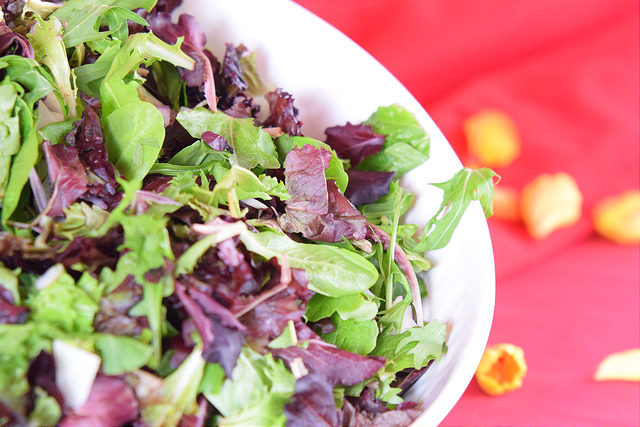We all know that food and nutrition are an integral component of overall health, but few know why Dr. Gerson chose specific staple foods such as oatmeal, potato, cooked vegetables, carrot juice and apple for the Gerson Therapy.
The Gerson diet is all organic and predominantly plant-based with a strong emphasis on generous, high-quality nutrition. The diet is naturally high in vitamins, minerals, enzymes, micro-nutrients, and extremely low in sodium, fats, and proteins. While much of the produce consumed each day is in the form of juice, it is also essential to eat a large portion of cooked food at every meal. Food is slow-cooked for easy digestion, which allows for easier assimilation of nutrients throughout the body. Both cooked and raw foods are encouraged.
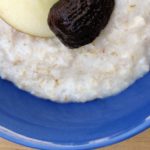
Rolled Oats: One half-cup of raw rolled oats contains: 180 calories, 3.0 g fat, 7.0 g protein, 20 mg calcium, and 1.8 mg iron. High in dietary fiber, protein, potassium, manganese and molybdenum.
For serious gluten intolerance or celiac disease, obtain a brand tested to be free of gluten or substitute with millet.
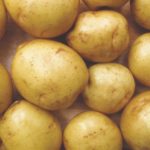 Potatoes: One large potato contains: 284 calories, 7.5 g protein, 4.5 g carbohydrate, .33 g fat, 1600 mg potassium, 22 mg sodium, 85 mg magnesium, 44.8 mg calcium, 72.7 mg Vitamin C, and trace amounts of B vitamins. The highly-colored potato varieties are rich in antioxidants, anthocyanins and carotenoids which are associated with a lower incidence of chronic diseases such as cardiovascular disease, atherosclerosis, rheumatoid arthritis and cancer.
Potatoes: One large potato contains: 284 calories, 7.5 g protein, 4.5 g carbohydrate, .33 g fat, 1600 mg potassium, 22 mg sodium, 85 mg magnesium, 44.8 mg calcium, 72.7 mg Vitamin C, and trace amounts of B vitamins. The highly-colored potato varieties are rich in antioxidants, anthocyanins and carotenoids which are associated with a lower incidence of chronic diseases such as cardiovascular disease, atherosclerosis, rheumatoid arthritis and cancer.
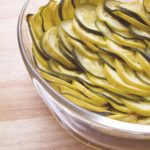
Cooked Vegetables: Choose from a variety of cooked vegetables, especially the cruciferous variety to get the important phytonutrients. The cruciferous include broccoli, cauliflower, kale, collard greens, Brussel sprouts, bok choy, cabbage, arugula and watercress. A number of studies have shown that the bioactive components of cruciferous vegetables have anti-cancer effects. Other vegetable choices include beets, asparagus, artichoke, green beam, squash and carrots.
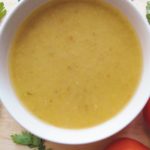
Hippocrates Soup: This soup is a staple of the Gerson Therapy. A minimum of 8oz. should be consumed at lunch and dinner. It is alkalinizing, detoxifying, and good for the kidneys. It is also high in antioxidants and essential vitamins and minerals, including potassium and vitamin K.
 Watercress: This is used in the green juice. It belongs to the cruciferous vegetable family, contains a good amount of calcium, phosphorus and potassium, and is high in glucosinolates, which are sulfur containing compounds beneficial in inducing detoxification. Watercress also contains PEITC (Phenethylisothiocyanate), a form of glucosinolate which is thought to have chemoprotective properties. It is also a plant easily infested with parasites, so wash carefully!
Watercress: This is used in the green juice. It belongs to the cruciferous vegetable family, contains a good amount of calcium, phosphorus and potassium, and is high in glucosinolates, which are sulfur containing compounds beneficial in inducing detoxification. Watercress also contains PEITC (Phenethylisothiocyanate), a form of glucosinolate which is thought to have chemoprotective properties. It is also a plant easily infested with parasites, so wash carefully!
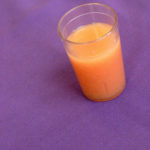 Carrot Juice: An eight ounce glass of juice made from approximately 1 lb. of carrots contains: 2.85 g protein, 100 mg calcium, 1.3 mg iron, 975 mg potassium, 2545 mcg vitamin A, 18 mg vitamin C and small amounts of B vitamins. While carrots lose some vitamins and minerals in the cooking process, the amount of falcarinol is increased, although it is still available in raw carrots. This information can explain in part why carrots may not exacerbate candida infections.
Carrot Juice: An eight ounce glass of juice made from approximately 1 lb. of carrots contains: 2.85 g protein, 100 mg calcium, 1.3 mg iron, 975 mg potassium, 2545 mcg vitamin A, 18 mg vitamin C and small amounts of B vitamins. While carrots lose some vitamins and minerals in the cooking process, the amount of falcarinol is increased, although it is still available in raw carrots. This information can explain in part why carrots may not exacerbate candida infections.
**Carrots contain a compound called falcarinol which is a natural pesticide. It protects the roots from fungal disease. A team of researchers from the University of Newcastle in England and Denmark found this natural pesticide reduced the risk of cancer developing in rats by one third. Research has confirmed that this substance has more anti-cancer properties than beta-carotene.
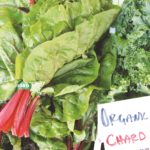 Swiss Chard: This is an ingredient in the Gerson green juice. Swiss chard is a good source of vitamin C, vitamin K, vitamin A, and the minerals calcium, magnesium, zinc and manganese, as well as antioxidant phytonutrients, including the carotenoids lutein and zeaxanthin and the flavanoid quercitin. These phytonutrients provide excellent anti-oxidant and anti-inflammatory benefits. The unique flavanoid phytonutrients offer special benefits for blood sugar control. Swiss chard inhibits activity of an enzyme called alpha-glucosidase which is used to break down carbohydrates into simple sugars. It also stabilizes blood sugar levels due to its high fiber content.
Swiss Chard: This is an ingredient in the Gerson green juice. Swiss chard is a good source of vitamin C, vitamin K, vitamin A, and the minerals calcium, magnesium, zinc and manganese, as well as antioxidant phytonutrients, including the carotenoids lutein and zeaxanthin and the flavanoid quercitin. These phytonutrients provide excellent anti-oxidant and anti-inflammatory benefits. The unique flavanoid phytonutrients offer special benefits for blood sugar control. Swiss chard inhibits activity of an enzyme called alpha-glucosidase which is used to break down carbohydrates into simple sugars. It also stabilizes blood sugar levels due to its high fiber content.
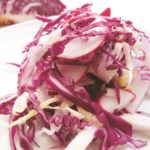 Red Cabbage: This is an ingredient in the Gerson green juice. Red cabbage contains a good amount of vitamin C. Its antioxidant and anti-inflammatory nutrients include beta-carotene, glucosinolates, anthocyanins and glutamine. One of the glucosinolates called sinigrin has received special attention in cancer prevention research, especially in respect to bladder, colon and prostate cancer. The glutamine content helps heal stomach ulcers and inflammation as well as regulates any bacterial populations of Helicobacter pylori inside the stomach.
Red Cabbage: This is an ingredient in the Gerson green juice. Red cabbage contains a good amount of vitamin C. Its antioxidant and anti-inflammatory nutrients include beta-carotene, glucosinolates, anthocyanins and glutamine. One of the glucosinolates called sinigrin has received special attention in cancer prevention research, especially in respect to bladder, colon and prostate cancer. The glutamine content helps heal stomach ulcers and inflammation as well as regulates any bacterial populations of Helicobacter pylori inside the stomach.
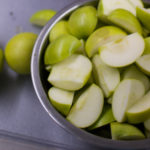 Apples: They are in the juices and can also be eaten raw or in apple sauce. Apples contain many phytonutriends and antioxidant nutrients, as well as fiber. Quercetin and other flavonoids inhibit carbohydrate digesting enzymes like alpha-amylase and alphaglucosidase. When these enzymes are inhibited, fewer carbohydrates are broken down into simple sugars, which keep the blood sugar in balance. Apples have antioxidant benefits that lower the risk of asthma and the risk of lung, colon and breast cancer. Other anti-inflammatory benefits are found to reduce blood levels of C-reactive protein, mainly from the quercetin.
Apples: They are in the juices and can also be eaten raw or in apple sauce. Apples contain many phytonutriends and antioxidant nutrients, as well as fiber. Quercetin and other flavonoids inhibit carbohydrate digesting enzymes like alpha-amylase and alphaglucosidase. When these enzymes are inhibited, fewer carbohydrates are broken down into simple sugars, which keep the blood sugar in balance. Apples have antioxidant benefits that lower the risk of asthma and the risk of lung, colon and breast cancer. Other anti-inflammatory benefits are found to reduce blood levels of C-reactive protein, mainly from the quercetin.
Apples also decrease the oxidation of cell membrane fats, helping to prevent atherosclerosis. The fiber, pectin, is linked to reducing the risk of cardiovascular disease by providing protection from oxidation of fats.
Download your FREE Gerson Sample Menu & Shopping List
Educational articles like this are made possible with the help of your donations.
References:
Source: United States Department of Agriculture Nutrient Database


